

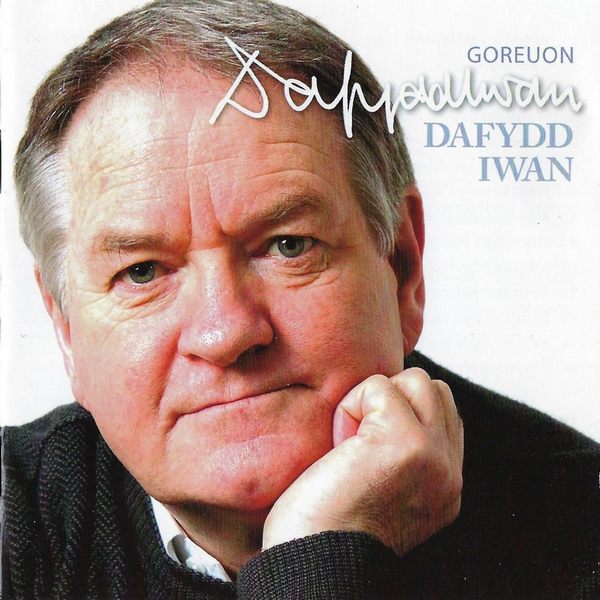 |
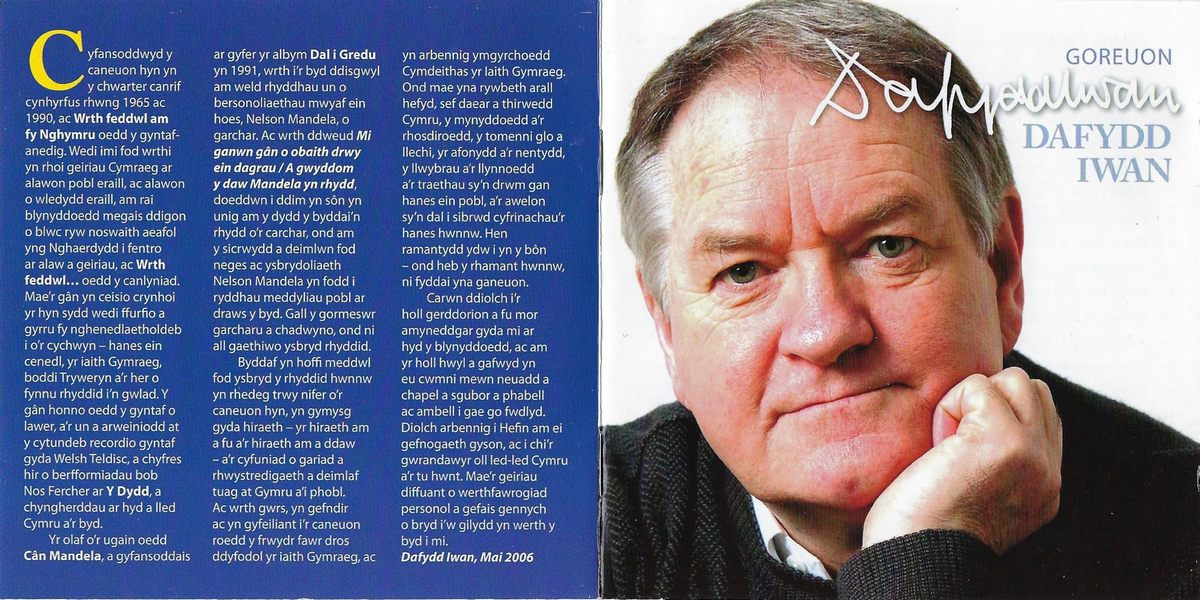
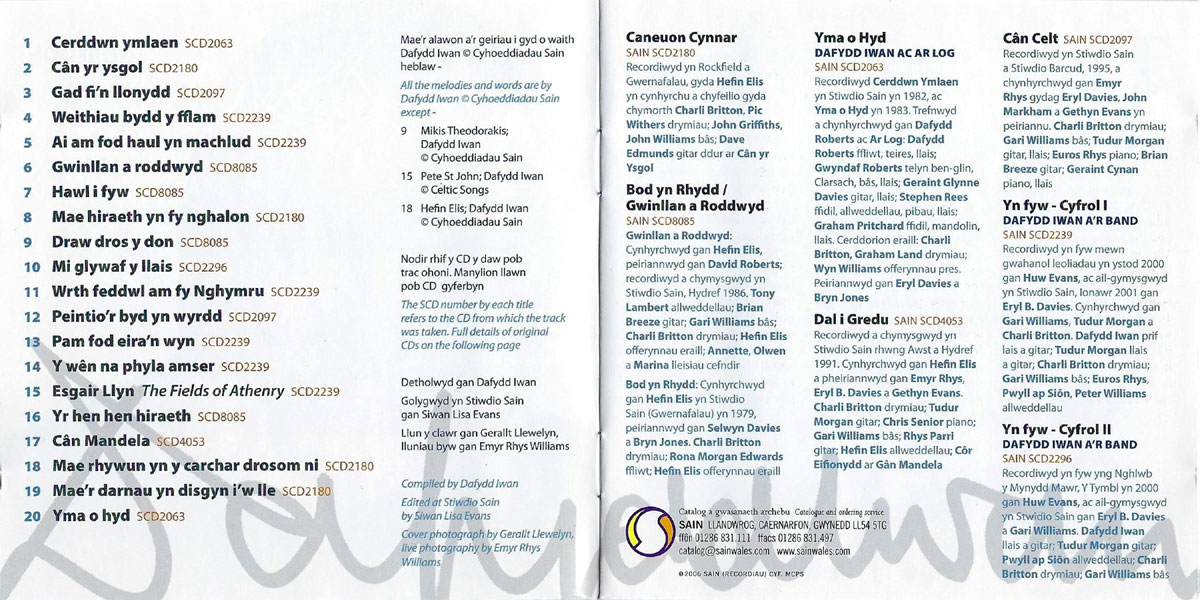
|
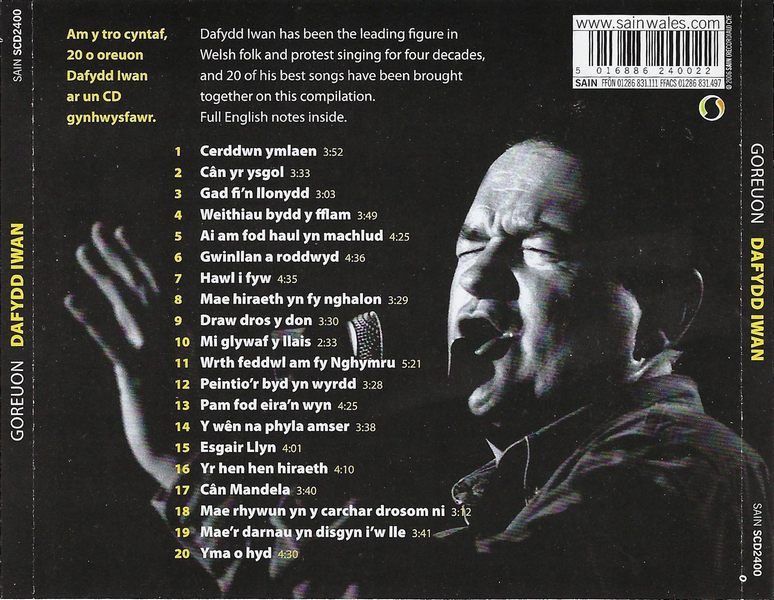
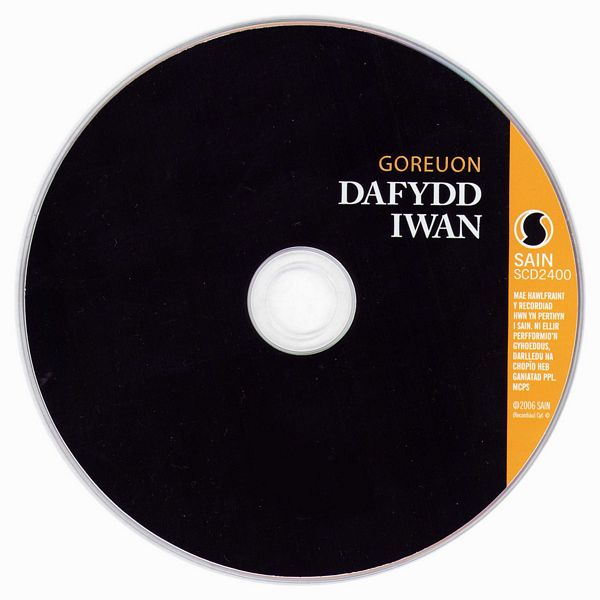
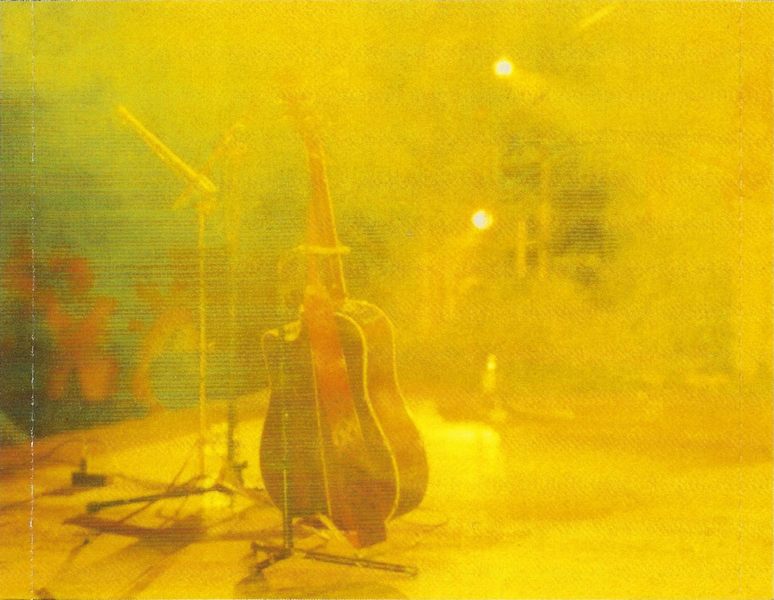 |
| more images |
Sleeve Notes
These songs were composed during that momentous quarter of a century between 1965 and 1990, and Wrth feddwl am fy Nghymru When I think of my Wales was the first-born. I had spent a few years putting Welsh words to other people's — and other countries' — songs, but one winter's night in 1965 in Cardiff I ventured to compose both words and melody, and Wrth feddwl … was the result.
The song gives expression to the four cornerstones of my nationalism — the history of our nation, the Welsh language, the drowning of the Tryweryn valley, and the challenge of setting Wales free. It was the first of many songs, and it led to my first recording contract, to a long series of TV spots every Wednesday evening on Y Dydd, and to concerts the length and breadth of Wales and in many other countries.
The last of the 20 to be composed was Cân Mandela Mandela's Song, written for my 1991 album Dal i Gredu, a song looking forwards to the release from prison of one of the great figures of our age, Nelson Mandela. And in saying We sing a song of freedom through our tears / And we know that Mandela will be free, I was not merely referring to his release from captivity, but to the certainty I felt that Mandela's message and inspiration was a means of freeing the minds of people throughout the world. The oppressor can imprison and enchain, but he cannot imprison the spirit of freedom.
I would like to think that the same spirit of freedom runs through many of these songs, mixed with a good helping of hiraeth — that special Welsh yearning for that which has gone, as well as that which is yet to come — and a combination of love and frustration which I feel for Wales and its people. And of course, forming a back-cloth and accompaniment to all these songs were the battles for the future of the Welsh language, especially the campaigns of Cymdeithas yr laith Gymraeg The Welsh Language Society. But there is something else as well, the land and landscape of Wales, its mountains and moors, its rivers and streams, its coal-tips and slate-heaps, its pathways and lakes and beaches, heavy with the history of our people, and the breezes which continually whisper the secrets of that history. Yes, I may be a big old romantic at heart — but without that romance there would be no songs.
Dafydd Iwan, May 2006
Cerddwn Ymlaen (Let us walk on) — A sister song to Yma o hyd, this was composed for my first tour with Ar Log in 1982, to commemorate the death of Llywelyn, last native Prince of Wales, in 1282. The first verse refers to the working people of Wales through the ages, in coal-pits, quarries and small-holdings, and the second to the harrowing death of Llywelyn, and his savage treatment by the forces of the English king. The chorus exhorts us to walk on through water and fire, against all odds, armed with our faith and belief in Wales.
Cân yr ysgol (The school song) — Like so many of my compatriots, I grew up in a Welsh-speaking community and family (in Brynaman), but when I entered secondary school, the whole world turned into English. Since then, education through the medium of Welsh has come on by leaps and bounds, but this was a cry from the heart (albeit in a light-hearted tone) on behalf of all the children denied the basic right of being educated in their own language in their own country.
Gad fi'n llonydd (Let me be) — So many of us use our Christianity as a cushion to lie on rather than as a vehicle for action. This is the cry of the supine Christian to be left alone, ignoring the fact that if Christianity means anything, it is a call for us to stand up and be counted.
Weithiau bydd y fflam (Sometimes the flame) — A song for the sad moments, when the flame burns low in life's lamp. But there's no use in sitting around moping, and tomorrow the sun will shine again and give us another chance.
Ai am fod haul yn machlud (Is it because the sun is setting) — A song of someone leaving, but it may not be a love song. As I grow older, this song becomes more and more religious in its message; we may often wander away from God, but He will always be there for us should we choose to return. If the curlew's cry is dying, and if the sun is setting, there is always hope in the light of the moon …
Gwinllan a roddwyd (A vineyard was given) — This song again has Biblical connotations, as it is based on a speech from one of Saunders Lewis' plays which in turn was based on the story of Naboth's vineyard. In the speech, Wales is the vineyard given to our care, and the song itself is a tribute to Saunders Lewis' great contribution as a nationalist, playwright and inspirational man of scholarship.
Hawl i fyw (The right to live) — This song was written in response to the Ethopian famine during the 1980s, brought to our homes so vividly by television. But what happens when the camera goes away? What happens to that little boy whose face filled our screen for a fleeting moment? Our tears and our money are not enough. He has the same right to live as any of us — and so do the children of Falluja and …
Mae hiraeth yn fy nghalon (There is longing in my heart) — Hiraeth is a peculiarly Welsh type of sentiment, or so we like to think. It may even be a Celtic trait — that longing for things lost, usually in the past, but also in the unreachable future. This is a song about Wales' past — the people who have gone, the lives of the working people who toiled under the master's yoke; but as I walk the mountains of Wales, I see my inheritance coming alive before my eyes.
Draw dros y don (Beyond the waves) — The songs in this collection for the most part are my own compositions, but there are three exceptions where the melody is by someone else, and this is one. Like many others who have been on holiday in Greece, I have been enthralled by the songs of Mikis Theodorakis, and by his part in the overthrow of the military regime. This is one of his best-known popular songs, but the words I have put to it relate my own experience of Greece, the ancient land of the sun to which freedom returned, and where the sound of the soldiers' feet and screams of the captive dissident are distant echoes.
Mi glywaf y llais (I hear the voice) — I have never consciously written a "hymn", but this is one that came close! The voice of the power behind the creation is to be heard in the world of nature around us, in the wind in the trees and in the mountain stream. But most of the time, we ignore it, and pass by on the other side. We do not know what lies ahead, and we certainly cannot make it alone …
Wrth feddwl am fy Nghymru (As I think of my Wales) — This was the first song I wrote both words and melody together, and it set the stage as it were for future songs. From today's perspective, it sounds rather pessimistic — but it was written in 1965, just after the drowning of the Tryweryn Valley, at a time when the Welsh language was not officially recognized, and before any talk of devolution by anyone in power. Come to think of it, Wales has not done too badly since — but I still sing the song, with a twist in the final chorus "and the people of Wales will be brave enough to demand her freedom!".
Peintio'r byd yn wyrdd (Painting the world green) — This was first released on an EP in 1970, at the height of the road-signs campaign. Before then, all official road-signs in Wales were in English only. After years of fruitless campaigning, we started on a direct-action campaign to obliterate English-only signs with green paint. There were hundreds of arrests, court-cases and imprisonments, culminating in the great Conspiracy Trial in Swansea in 1971. As Chair of Cymdeithas yr laith, I became for a time public enemy number one. But in many ways, this was the most effective and successful direct-action campaign in the recent history of Wales. The song, however, uses the metaphor of painting the world green to mean much more than bilingual signs; if we want a fairer, sustainable world, we must do something about it and refuse to let the powers that be walk all over us.
Pam fod eira'n wyn (Only fools ask why snow is white) — As we fully expected to be imprisoned for a year or two in the above-mentioned Conspiracy Trial, this song was recorded during the trial as a message from prison. It seemed to me that we were being asked questions that do not need to be asked in a normal country, like Why is the Welsh language so important to you? When we see the sun on the mountain, the wind on the sea, when we hear the old songs of our country and the sounds of our ancient tongue, and as we recall the hardship suffered by Welsh workers through the ages, we know what Truth and Freedom is, and what it is to belong to a people and a land …
Y wên na phyla amser (The smile that time will not fade) — A song in tribute to one of my heroes, DJ. Williams. He was a fine author, and a great patriot. Imprisoned with Lewis Valentine and Saunders Lewis for burning the Bombing School in 1935, he did not have a bad word for anyone. His patriotism sprung from a deep love of humanity, and a thorough knowledge of his square mile, the phrase he devised for the place of his birth in Carmarthenshire. His ever-present smile conveyed perfectly the 60s slogan think globally and act locally.
Esgair Llyn (Welsh words to 'The Fields of Athenry') — My friend Ray Gravell sent me a recording of Athenry by The Wolfetones, beseeching me to write Welsh words to this powerful melody. What came to mind was a place in Montgomeryshire where I spent many a holiday as a boy, on my uncle's farm. Esgair Llyn was a ruin then, and now is not even a ruin; a place full of memories, full of Wales past. And it is in these very places — for we all have our own personal Esgair Llyn — we must see the future as well. Diolch Ray.
Yr hen hen hiraeth (That old, old hiraeth) — Here we go again! Usually, when I revert to the hiraeth mode, I shake myself out of it by the last verse or chorus, and proclaim that one cannot live on longing alone, that we have to do something about changing the present. But this song unashamedly, incontrovertibly wallows in that which has gone; as W.B. Yeats says (in a more revolutionary context): all changed, changed utterly / a terrible beauty is born.
Cân Mandela (Song for Mandela) — Like so many of my generation, I did my little bit for the campaign against the apartheid regime in South Africa, and Nelson Mandela was a figure commanding great respect. His imprisonment epitomised the cruel regime, and his long-awaited release was to be the dawn of a new era. Little did we know how true that would be, and how the influence of this man would grow as the world saw the dignity of his journey from captivity, and his complete lack of hatred for his captors.
Mae rhywun yn y carchar drosom ni (Someone is in prison for us) — These words were written in response to the imprisonment of so many campaigners for the Welsh language during the 60s, 70s and 80s. As their numbers grew, and as the severity of their sentences increased, the political effect diminished, and a frustration set in to see so many young (and older) people imprisoned in vain. But it was not in vain; wherever there is a just cause to fight for, people have to make a stand. It is not easy for those of us who prefer a quiet life to know how to respond, but somewhere in the world, there is always someone suffering on our behalf, to guard our freedom. And those who suffered imprisonment for Wales and the Welsh language should never be forgotten. Hefin Elis composed one of his most powerful melodies for this one.
Mae'r darnau yn disgyn i'w lle (The pieces are falling into place) — By the mid-70s, I had ceased to be a front-line active member of Cymdeithas yr laith, and had even stood for parliament in 1974. This song, released in 1976, has the air of someone looking for an excuse to settle down as the spectre of middle-age breaks the horizon. Its core message is that I find the meaning of things when I'm alone on the moorland and mountains; that is where the lies of the politicians fade into insignificance, and the pieces fit into place, and life begins to make sense.
Yma o hyd (Here still) — As far as many people are concerned, I am a one-song man, and this is that song. It is played at Parc y Strade whenever Llanelli Scarlets score, and it's played at Ninian Park before every Cardiff City home game, and I have even sang it at the Millennium Stadium before a soccer international. Whatever the reason for it, this anthem to the survival of Wales and all the small nations of the world who have made it to the 21st century has struck a chord with people of all ages, far and wide. My thanks to Ar Log for the arrangement which has been so much a part of its success, and my thanks to everyone in Wales, including so many who have now gone, for believing in their own nation, and for believing in the great potential of Wales and her people.